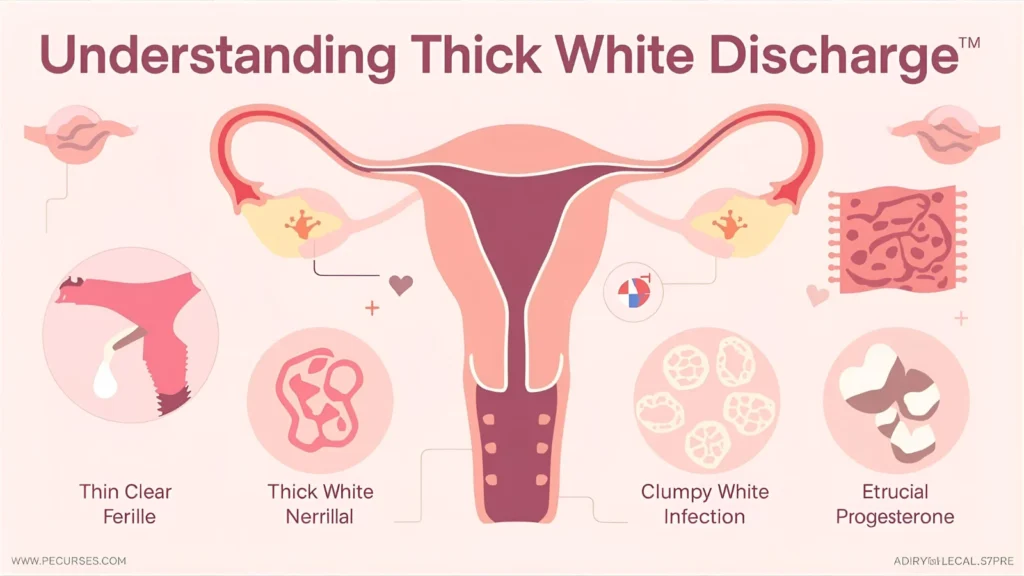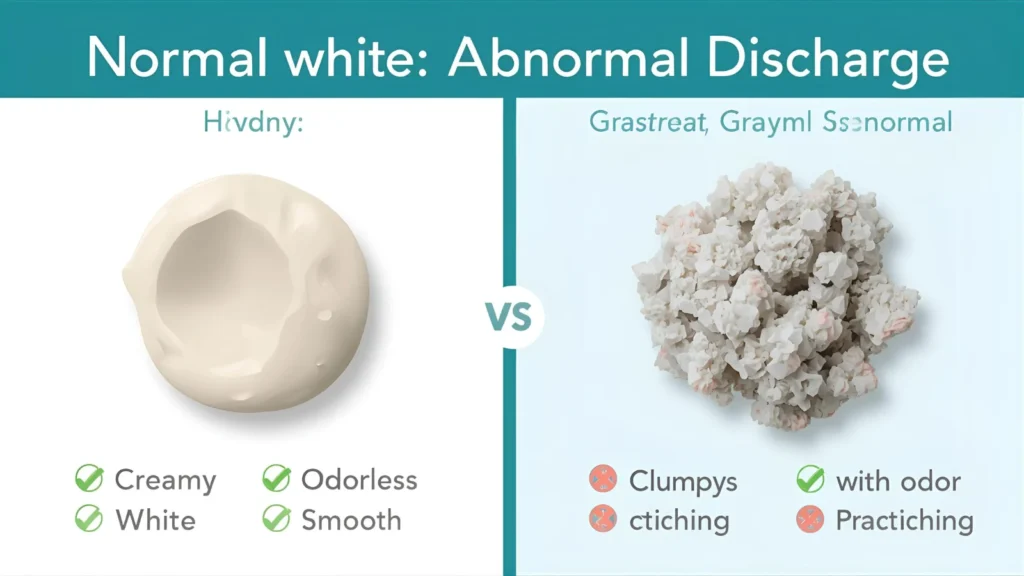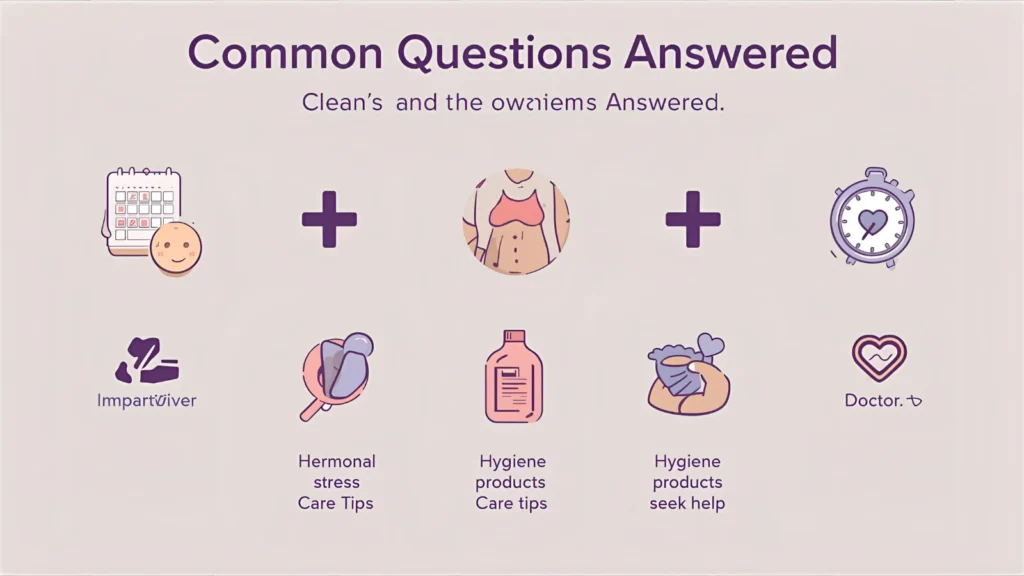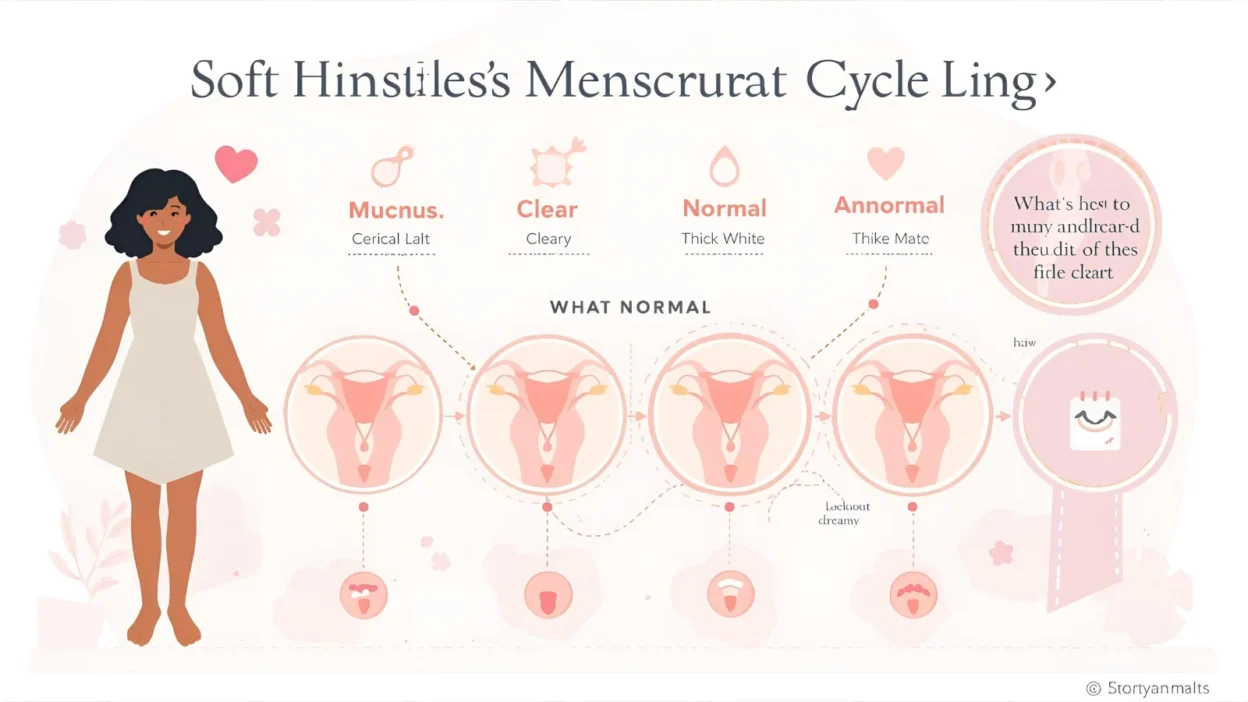Have you ever noticed thick white discharge and instantly wondered, “Wait… is this normal?” You’re not alone — many people experience this and feel a little confused or worried at first.
The good news is, in most cases, it’s totally normal and a healthy part of your body’s natural cycle.
Still, it helps to understand what it really means, when it’s okay, and when you might need to pay more attention.
Quick Answer:
Thick white discharge usually means your body is cleaning itself and maintaining healthy vaginal balance.
It’s often normal before your period or after ovulation — unless it’s accompanied by itchiness, odor, or irritation, which could signal an infection.
🧠 What Does Thick White Discharge Mean?

Let’s break it down simply.
Thick white discharge — sometimes described as creamy, milky, or lotion-like — is made up of cervical mucus, dead cells, and bacteria that help keep your vagina clean and healthy.
It often appears:
- Before your period
- After ovulation
- During early pregnancy
In these times, hormone levels (especially estrogen and progesterone) rise and change the texture and color of the discharge.
Normal thick white discharge is:
- White or off-white
- Odorless or mild-smelling
- Not itchy or irritating
In short: Thick white discharge = a natural sign of a healthy cycle.
But if it’s clumpy (like cottage cheese), smells bad, or causes itching or burning, it could be a yeast infection or bacterial imbalance.
📱 Where Is the Phrase “Thick White Discharge” Commonly Used?
You’ll often see people talking about this phrase on:

- 💬 Reddit forums like r/WomensHealth or r/AskDocs
- 📱 TikTok or Instagram health content (with creators breaking the stigma about body talk)
- 💻 Search engines and medical sites like WebMD or Healthline
- 🩺 Doctor’s offices and health apps (like Flo or Clue)
It’s not slang — but it’s a very common search term people use when trying to figure out if what they’re seeing is normal or not.
It’s casual but health-related, so it’s fine to discuss in educational, supportive, or medical settings — not really in flirty or social chats.
💬 Examples of How People Use the Phrase
Here are some realistic examples of how this phrase might show up in everyday online talk:

A: “Hey, I’ve had thick white discharge for a few days. Is that normal?”
B: “If it’s not itchy or smelly, it’s probably just before your period.”
A: “I’m having thick white discharge and cramps — could I be pregnant?”
B: “Totally possible! That’s common in early pregnancy.”
A: “Does anyone else get thick white discharge after ovulation?”
B: “Yes! Mine happens around day 20 of my cycle.”
A: “Thick white discharge but no smell — should I worry?”
B: “Nope, sounds like your hormones are just doing their thing.”
🕓 When It’s Normal and When It’s Not

✅ When It’s Normal:
- Before your period (pre-menstrual phase)
- After ovulation (luteal phase)
- During pregnancy (due to hormonal increase)
- As part of normal lubrication and cleansing
❌ When to Watch Out:
- If it’s chunky or cottage cheese-like → could be a yeast infection
- If it’s gray or fishy-smelling → might indicate bacterial vaginosis
- If it’s greenish or yellowish → could be a sexually transmitted infection (STI)
- If it’s causing itching, burning, or swelling → definitely worth seeing a doctor
| Context | Example Phrase | Why It Matters |
|---|---|---|
| Pre-period | “I get thick white discharge every month.” | Normal part of your cycle |
| Early pregnancy | “White creamy discharge before missed period.” | Often early pregnancy sign |
| Yeast infection | “Clumpy thick discharge and itching.” | Likely yeast infection |
| Bacterial vaginosis | “White discharge with bad odor.” | Needs medical attention |
🔄 Similar Terms or Related Conditions
| Term | Meaning | When It Happens |
|---|---|---|
| Cervical mucus | Fluid that helps sperm travel during ovulation | Mid-cycle |
| Leukorrhea | Medical term for white vaginal discharge | Throughout cycle |
| Yeast infection | Thick, clumpy discharge + itching | Anytime |
| Bacterial vaginosis | Thin, grayish discharge + odor | Post-intercourse |
| STI discharge | May be yellow or green | After exposure |
❓ FAQs About Thick White Discharge
Q1: Why do I have thick white discharge before my period?
Because of hormonal shifts — your body increases progesterone, making discharge thicker.
Q2: Is thick white discharge a sign of pregnancy?
Yes, it can be. In early pregnancy, increased estrogen and blood flow to the vaginal area cause more milky-white discharge.

Q3: Can stress cause white discharge changes?
Absolutely. Stress affects hormones, which in turn can alter your discharge consistency.
Q4: When should I see a doctor?
If there’s odor, itching, burning, or pain — those are red flags for infections.
Q5: How can I keep my vaginal health balanced?
Wear breathable cotton underwear, avoid scented soaps, and maintain good hygiene.
🌸 Conclusion
Thick white discharge is usually just your body’s natural way of keeping things clean and balanced.
It may happen before your period, after ovulation, or during pregnancy — and that’s totally normal.
But if it changes color, texture, or smell, don’t ignore it. Your body is smart — discharge is its way of giving you clues. Listen to it, care for it, and talk openly about it without shame.

Robat Hood is a creative writer and contributor at Saypadia, focused on explaining trending words, slang, and cultural phrases in a simple and engaging way. With a sharp eye for modern language trends, Robat aims to make Saypadia a trusted place for understanding how words are used online and in daily conversations. His content is informative, approachable, and designed for readers of all levels.




